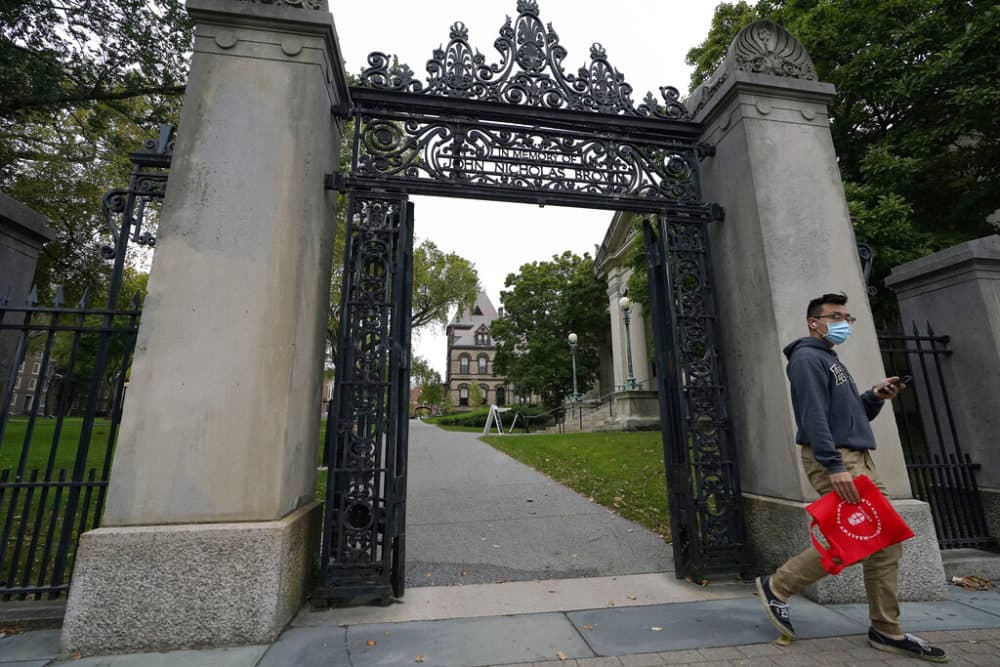Advertisement
Lawsuit Alleges Brown University Failed To Protect Women From Sexual Misconduct

Brown University has systematically and repeatedly failed to protect women from rape and other sexual misconduct, according to a federal class action lawsuit filed recently by four current and former female students.
The suit, which was filed last Friday in Providence federal court, alleges the Ivy League school in Rhode Island actively prevented the reporting of incidents of sexual violence and perpetuated a “culture of silence” on campus.
One of the women said she was advised against making a formal complaint after being raped at a party hosted by players on the men’s rugby team because it happened off-campus, where officials said it would be more difficult to hold someone accountable.
Kim Evans, one of the lawyers representing the women, said Monday that the women's experiences dealing with university administrators are particularly shocking given they come years after the #MeToo movement sparked a global reckoning on sexual misconduct.
“It’s hard enough for a survivor of abuse to come forward with their truth, even under the best circumstances. But here we have Brown survivors who are met with apathy and indifference, which makes a really hard situation, even more traumatic,” she said.
Cass Cliatt, the university’s senior vice president for communications, said Monday that the university is aware of the lawsuit but has not been formally served.
She said in an email that Brown has taken a “strategic and sustained approach” to confronting sexual misconduct on campus, including recommendations from the university’s sexual assault task force released in 2015.
“Brown has made it an institutional priority to create an environment in which no incident of sexual violence is tolerated, and the experiences and perspective of students and others impacted by sexual violence have been instrumental in informing the actions we’ve taken,” she said.
In a joint statement, the four women named in the suit dismissed the school’s recent efforts as “begrudging, minor changes to policy and procedure” that have “failed to ameliorate the rampant public health crisis of sexual violence” on campus.
Advertisement
“The so-called systems of justice and support at Brown, as well as the faculty, staff and administrators who implement them, actively perpetuate and exacerbate the injustices and harm they claim to remedy,” the women said. “Survivors at Brown are silenced, harmed, dismissed and discouraged from seeking justice by the university.”
They say in their suit that Brown’s poor response to sexual misconduct allegations violates numerous provisions of Title IX, the federal law barring gender-based discrimination, resulting in negligence, breach of contract, and “intentional infliction of emotional distress.”
They also say the university’s Title IX office is woefully undersized and that its training on sexual misconduct policies and procedures do not meet federal standards.
The women named in the litigation are Chloe Burns, a 2019 graduate; Taja Hirata-Epstein, a 2020 graduate; Katiana Soenen, a rising sophomore; and Carter Woodruff, who matriculated in 2016 but went on medical leave and is seeking reinstatement. The Associated Press does not generally identify alleged victims of sexual misconduct unless they decide to speak out publicly.
If granted by a judge, their class action suit would cover all women who attended Brown starting in 2018 and were survivors of sexual violence, which lawyers for the women suggest could be in the thousands.
Evans said the women want a court order compelling the university to comply with federal Title IX requirements, as well as any damages allowable under law.
“Their primary focus here is making changes and getting reforms to protect current and future students,” she said.
The lawsuit follows protests this spring led by a student group critical of the university's handling of sexual assault claims, said Elizabeth Bailey, another lawyer representing the women.
But the problems at the university stretch back to 1985, she said, when survivors began a campaign of writing the names of their perpetrators on the library bathroom walls, she said.
“Our clients are taking this necessary step, convinced that, given its previous decades of inaction, Brown will simply continue to act like it’s the 18th century and perpetuate its noncompliant, haphazard and ineffective internal grievance process,” Bailey said.
More from WBUR
Other prominent colleges have recently settled lawsuits dealing with widespread sexual assault on campus.
In March, the University of Southern California agreed to an $852 million settlement with more than 700 women who have accused the college’s longtime campus gynecologist of sexual abuse.
In 2019, Dartmouth College settled a federal lawsuit with nine women who sued the Ivy League institution in New Hampshire over allegations that it ignored years of harassment and assault by former psychology department professors.
Meanwhile Brown, which was founded in 1764 and has more than 10,000 students, settled a federal lawsuit in September challenging its decision to reduce several women’s varsity sports teams, including fencing, golf and skiing to club status. That settlement included some $14 million in compensation for current and former students.